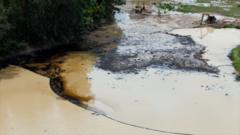Whistleblower Andrés Olarte exposes over 800 pollution incidents related to Ecopetrol’s operations, highlighting serious environmental concerns in Colombia's biodiverse regions, while local communities face dire threats as they advocate for change.**
Unveiling Ecopetrol's Environmental Crisis: Whistleblower Exposes Pollution Secrets**

Unveiling Ecopetrol's Environmental Crisis: Whistleblower Exposes Pollution Secrets**
A former employee of Colombian oil giant Ecopetrol reveals extensive pollution violations and potential cover-ups that threaten local biodiversity and waterways.**
Colombian oil giant Ecopetrol is under scrutiny following revelations from whistleblower Andrés Olarte, exposing a significant pattern of environmental pollution affecting numerous sites across the country. An investigation by the BBC has uncovered leaked data indicating that Ecopetrol has a history of pollution incidents that dates back to 1989, with over 800 locations reportedly contaminated, including crucial water sources and rich wetlands. Alarmingly, the firm allegedly failed to report approximately one-fifth of these occurrences.
Despite ongoing concerns, Ecopetrol maintains that it adheres to Colombian environmental laws and employs leading sustainability practices. The main refinery, located in Barrancabermeja, sits on the banks of the Magdalena River, a critical water source for millions. Local residents, including fishermen fearing for their livelihoods, have raised alarms about the impact of oil spills, often describing the foul smells of oil-coated fish caught from polluted waters.
While the company challenges the validity of residents' claims about contamination, Olarte, who worked for Ecopetrol from 2017 to 2019, reveals a troubling official culture of silence regarding pollution documentation. Upon joining Ecopetrol, he became alarmed by the company's inadequate response to pollution data and began documenting ongoing environmental impacts. After leaving the company, Olarte shared this information with investigative agencies, confirming that some areas have stayed polluted for over ten years without remediation.
Ecopetrol's response has prompted accusations of misinformation, as data shows hundreds of reported oil spills every year since 2020. Former officials have denied any intent to hide pollution information. Surprisingly, the company's former CEO, Felipe Bayón, asserts that incidents of sabotage are often to blame for oil spills, although only a small fraction of reported incidents falls under this category.
However, the implications of these environmental transgressions extend beyond ecological damage. Both Olarte and local activists, such as Yuly Velásquez, who leads the regional fishing federation, have been targets of intimidation, prompting concerns for their safety. The possible connections between the security employed by oil companies and ongoing threats to environmental defenders in Colombia paint a deeply concerning picture of accountability challenges within the oil industry.
As the investigation uncovers the extent of pollution and the dangers faced by those advocating for the environment, Olarte continues to pursue legal actions against Ecopetrol, vowing to protect his home and community. With Colombia being labeled as one of the most dangerous countries for environmental defenders, the need for transparency and accountability in the oil sector has never been more pressing.



















